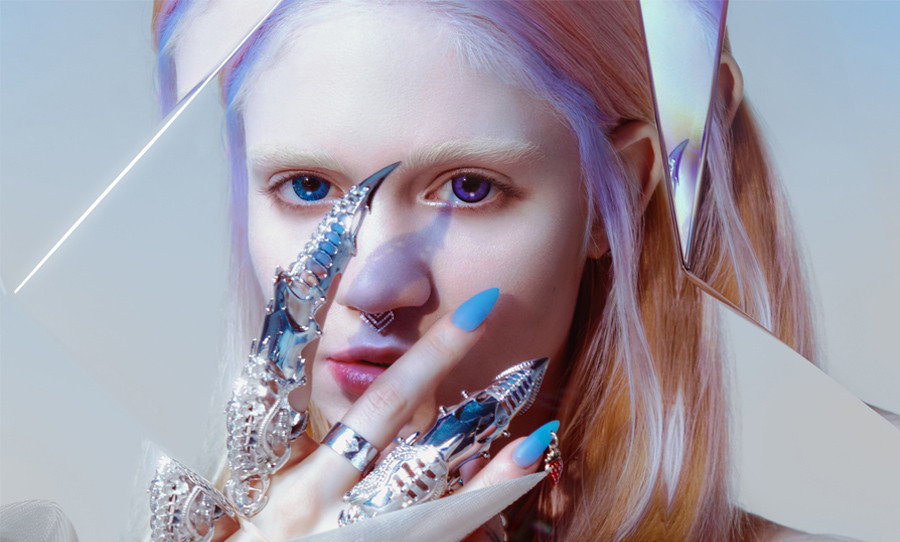Life, death, addiction, trauma and the ethereal. Despite rarely publicising it herself, Grimes is an artist healing her own wounds through otherworldly soundscapes and visions. Throughout the last decade, Claire Boucher rose from the neuroscience labs of Montreal’s McGill University into an artistic circuit encompassing the greats, proving herself as a production powerhouse, artistic prodigy, and visionary.
However, following the third anniversary of her seminal record Art Angels, a publicised relationship with Tesla-founder Elon saw her career thrust under the scorn of the mainstream public. Her decade-rich archive of vibrant multimedia narratives was seen as comical, her nuanced creative choices were easy targets for meme culture. As happens to many female artists in high-profile relationships, her career was overshadowed by her partner’s reputation.

Grimes’ ethereal imagination and hyper-real sonic universes are genre-defining. However, is her relationship with the wild-card Tesla founder clouding our appreciation of her genius?
Claire Boucher spent the last decade climbing; through the rankings of Montreal’s underground with 2010’s Geidi Primes and Halfaxa, through the metamorphosis of indie-pop with 2012’s Visions, coming to rest in a rich virtual niche of alt-electro-pop with 2015’s Art Angels. With GarageBand, a second-hand keyboard, and no musical experience, Boucher quickly discovered her talent for crafting alternate realities through production at the age of 23.
Layer on volumes of radiant imagination, gut-punching electro-beats, vocals which transform from angelic to piercing in milliseconds, and years of intense visual media co-ordination, and you have Grimes: an ethereal-being ravaged by a realm of gods, demons, and anthropomorphic trauma.
“I engineered a popstar… but I use myself. I directed all the videos, did all the album art, mixed and produced all the songs,” Boucher noted about the project in a 2013 interview with Hunger TV. “It was totally DIY, it started out with me finding tapes in the garbage, and a tape copier in the garbage and copying the tapes by hand.”
It is her completely hands-on approach that brings so much virtuosity to her work, something that is no more evident than in her latest record Miss Anthropocene. Quoting that the album narrates a “pantheon of new gods,” Boucher designed each of the record’s 11 tracks around a different “means of death, personal crisis, or modern feeling.” The title itself, a play on the words misanthrope and Anthropocene, manifests the god of climate change.
“I thought trying to give it a name or a face, for me, makes it a bit more digestible and a bit easier to consider on a daily basis…,” Boucher noted to triple j. “I need[ed] to make this easier for me to consume and continue to engage with it because I can’t just tap out right now, that was my goal.”
The entire record boasts the immense weight of Boucher’s arithmetic production, pausing for breath only during Delete Forever – the Demon of Addiction. Palatial yet gentle, poignant yet imagined, the folk-esque track was penned about Boucher’s experience with opioid addiction, an ailment which claimed the lives of six of her friends.
With an overwhelming subtly and honesty, Boucher transforms an all-too-known narrative into the sorrows of a cosmic empress, looking down upon her ruined kingdom. “Flew into the sun, fucking heroin(e)”, “I see everything…I did everything”, “cannot comprehend, lost so many men. Lately, all their ghosts turn into reasons,” lyrics which equally traverse both realities, offering grief and sensitivity.
Despite the fact that her style of writing comes simply out of creative ease, employing alternate realities and identities as a canvas to mend personal wounds is a feat only achieved by music’s most respected. Bowie, Prince, McCartney, and 2Pac all paved the way for what Boucher is currently achieving.
“Grimes is the uncensored version, from an artistic standpoint,” she noted to HungerTV. “What I’m doing with music, it’s stuff that I can’t talk to people about. Like I can’t say in front of my friends, I couldn’t.”
“That’s the weird thing about this, is that it’s way more real but because it’s so surreal, to access such a huge number of people rather than a small number of people.”
However, it isn’t just her infinite creativity or narrative abilities which give the Grimes outfit its distinct expertise, rather her aptitude for sonic hyper-literacy. An entirely self-directed production allows Boucher the freedom to embed deeply rich symbolism and undercurrents throughout a single or album. Her largest song Oblivion is a poster child of this genius.
Radiating beats and celestial vocals, it’s an inherently upbeat tune. Yet, Grimes’ lyrics are a harrowing portrait of Boucher’s own sexual assault, and the trauma which has haunted her since. “I never walk about after dark, it’s my point of view. And someone could break your neck, coming up behind you, always coming and you’d never have a clue,” she sings. “See you on a dark night.”
Instead of painting Oblivion within an alternate universe like her other works, Boucher does the complete opposite. She goes to a motor-cross event, a football final, and a men’s change room. The music video is painfully mundane in the most powerful way. Images of her traversing a world dominated by the male gaze illuminate the poisoned reality which victims are forced to return to, and the normalising of rape culture in our everyday. The viewer is left in awe.
And yet, put Grimes’ name into Google right now and you’ll come up with this:
“What you need to know about Grimes, the Canadian musician who just had a baby with tech billionaire Elon Musk.”
“Elon Musk and Grimes can’t agree on how to pronounce their baby’s name.”
“What is an X Æ A-12?”
Claire Boucher is exercising musical wisdom well beyond her years as an artist. A polymath of production, she crafts songs into teaming universes of hallucinogenic realities and nocturnal soundscapes, full of symbolised agony and double meanings which blend the imagined with the excruciatingly real. All of which have been ignored in her tabloid-promoted persona as the eccentric girlfriend of the Twitter-addicted Tesla founder, and mother of their unconventionally-named baby.
In our hyper-commercialised society, it has become frighteningly easy for these media-circulated identities to plague artists. Once a meme, always a meme. Whilst many do recognise Grimes’ artistry, as seen in the staggering reception of Miss Anthropocene, her well-documented relationship has undeniably dominated her public narrative. However, this certainly hasn’t stopped Boucher from continuing to push her project and the bounds of creativity as far as it can reach.
“People seem to assume that I’m an air-head, that I’m a druggy, weird and on Tumblr… I think it’s hard for people to grasp that someone can produce and be a front person, maybe…” Boucher recalled back in 2013.
“It’s been really interesting for me to see how easy it is to actually create this…I don’t want to say fantasy… I’m in the process of moulding reality. And coming to take great pleasure out of building this idea of what Grimes is, and controlling everything about it.”
We have allowed so many under-appreciated artists slip through the cracks before because the world simply wasn’t ready. Perhaps it’s about time we appreciate the cosmic talent that is Grimes.


